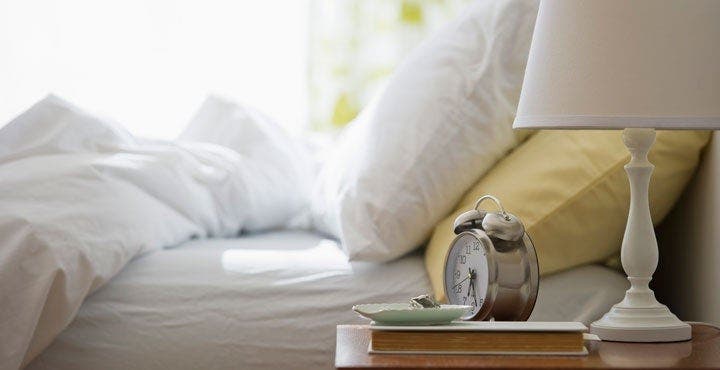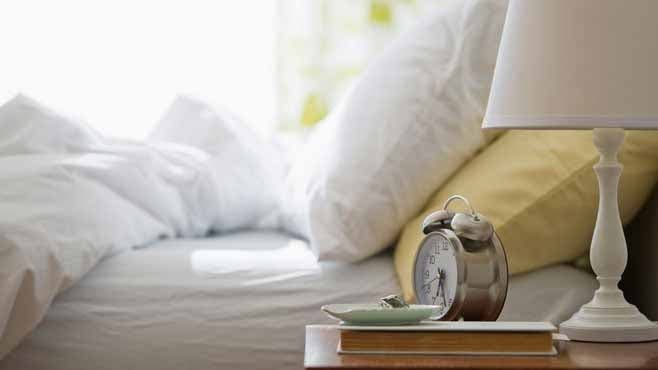A Sleep-Friendly Bedroom for Better Rest


Getting poor sleep doesn’t only make you nod off at your morning meeting. There is growing scientific evidence to show that not getting enough shut-eye can negatively affect your mood and mindset, the hormones that regulate hunger and appetite, and the foods you have a yearning for—all of which could lead to weight gain. But a proper sleeping environment can help you get better shut-eye, says the National Sleep Foundation.
A little bit of prep work now can help go a long way toward better sleep, and, as a result, may lead to better health.
Here’s how to design the perfect sleep environment, from your windows to your walls.
Keep it tidy
Your bedroom should feel like a sanctuary for sleep, and that’s hard to accomplish if your laundry is thrown on the floor and your bed is a mess, says W. Chris Winter, MD, author of The Sleep Solution: Why Your Sleep is Broken and How to Fix It.
“After a day of work, you want to enter a room that’s really tidy and orderly. There’s the ritual of getting into bed instead of this weird continuation of something that happened 18 hours ago that you’re looking at, you’re going to sleep better,” he says.
In fact, a survey by the National Sleep Foundation found that people who said they made their bed every day were 19 percent more likely to sleep well at night than those who just tossed the sheets off and started the day.
Pick the right bedding
Making your bed is just half the battle. The sheets you sleep in might make or break your sleep, says Winter. Opt for moisture-wicking fabrics that will help you stay cool and keep your skin from feeling clammy at night. If you’re having to layer up at night or rip off your clothes in the middle of the night, try tinkering with your blankets and sheets.
“You want to create a situation where you are relatively unclothed but you’re controlling your temperature based upon sheets and blankets in your bed. If you’re cold when you go to bed, putting on sweatshirts is not a great plan for temperature control,” says Winter.
Additionally, consider your mattress and pillow. Finding the right level of support for you could help make for a more comfortable—and sound—night's sleep.
Shade your windows
Darkness triggers the release of sleep-inducing hormones, but most of us don’t give our bodies the chance to do that, says Winter.
“When it’s time to go to bed I think it’s really important that our bedrooms be not only dark, but exceptionally dark,” he says.
He suggests investing in blackout blinds—not shutters or flimsy blinds—that keep any light from streaming in. Your room should be so dark that you could pull down the shades in the middle of a sunny day and not see your hand in front of your face.
“If you can’t, use some sort of mask or other device that’s going to allow the light that’s reaching your eyes to be diminished,” says Winter.
Have a zen nightstand
As tempting as it may be, your bedside table is not the place to keep your smartphone, says Winter. Not only can the temptation to browse and swipe stir up your mind before sleep, but smartphones and other devices emit blue light that may harm your quality of sleep. Instead, keep your nightstand clear of tech and cover the time on your alarm clock, suggests Winter.
“I think knowing what time it is at night is extremely overrated,” he says. “It could create anxiety for some people if they have to get up at 6:30 and they wake up and see it’s 5:30 and think, ‘Oh my gosh I only have an hour to go back to sleep.’”
In place of devices, Winter suggests using the space for some sort of sturdy knickknack that won’t break when you toss it on the ground. If you’re lying in bed being kept awake by something you need to remember in the morning, you can think of that task while you knock the item off the nightstand. You’ll be able to fall asleep knowing that when you see the item on the floor in the morning, you’ll remember what you need to take care of. (Winter keeps a wooden rhinoceros onside his bed table for this very reason.)
Pay attention to sound
A noisy bedroom is—not surprisingly—hardly conducive for good sleep, but one that's too quiet may also not work for you. Some people need silence to nod off, while others prefer soothing background noise (whether the whir of a fan or a sleep sound machine). You may also benefit from background noise—and ear plugs!—if outside sounds (a yapping dog or neighbour’s music) keeps you up.
